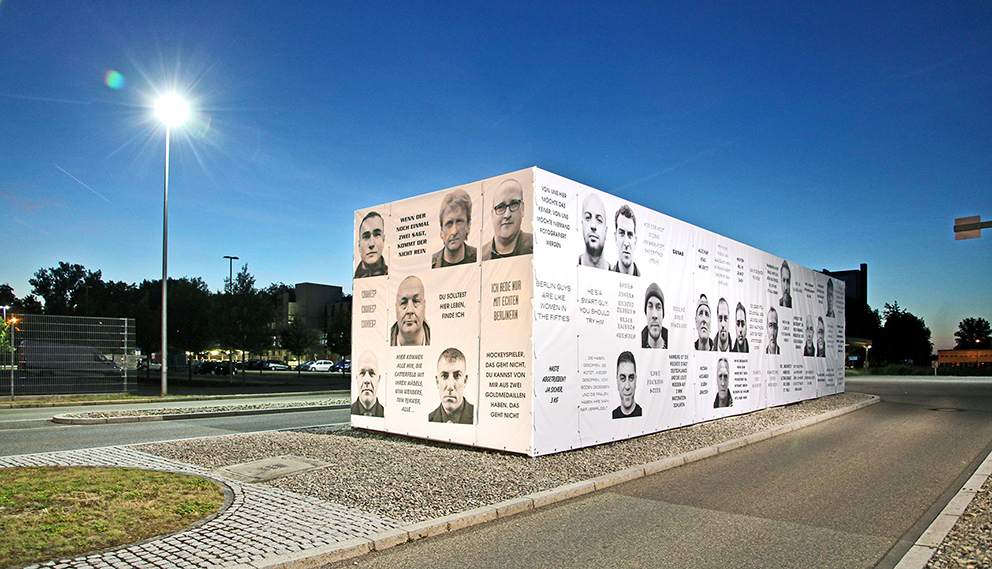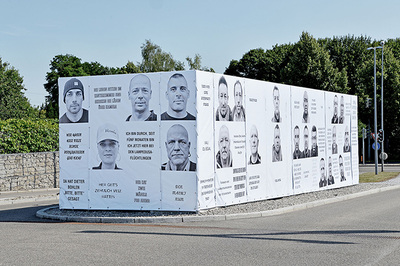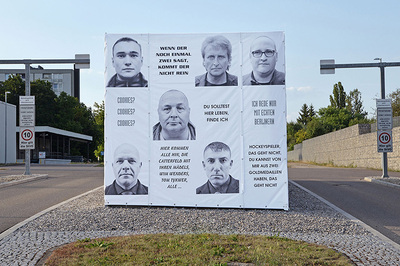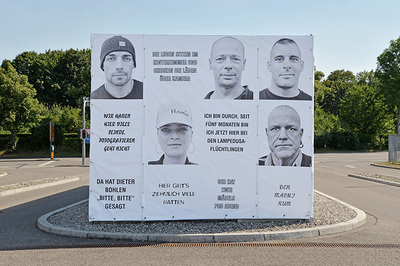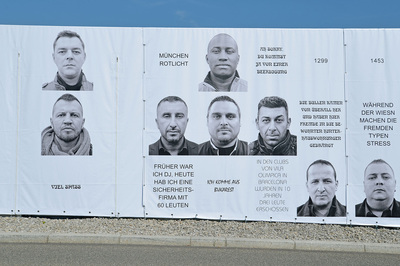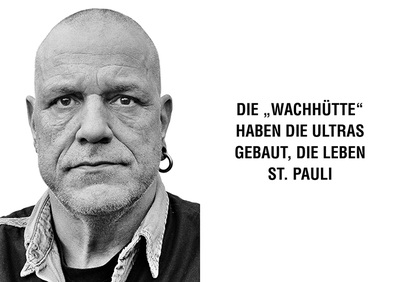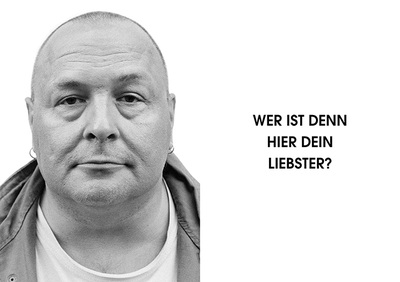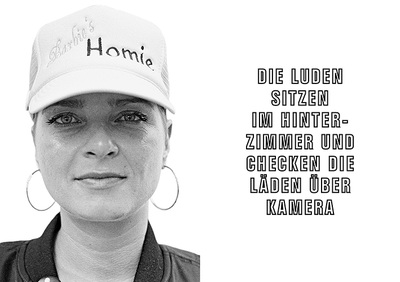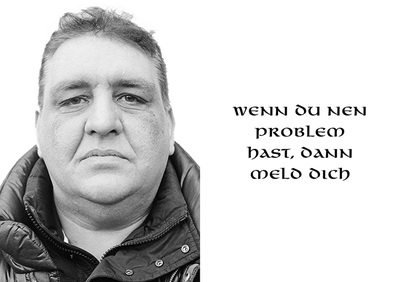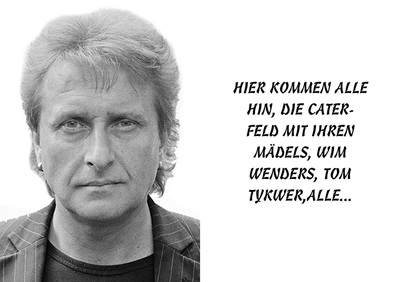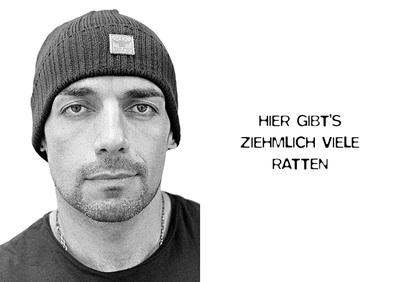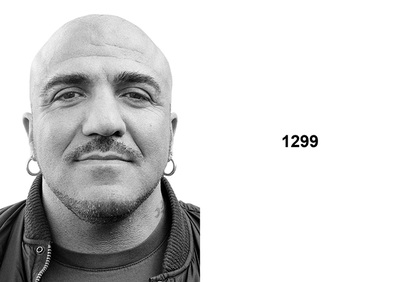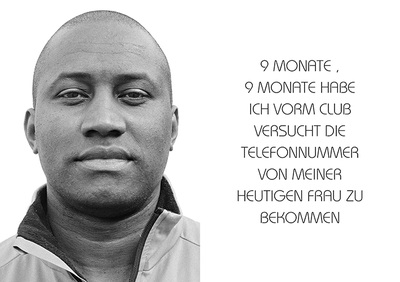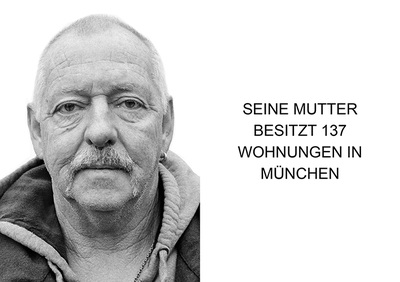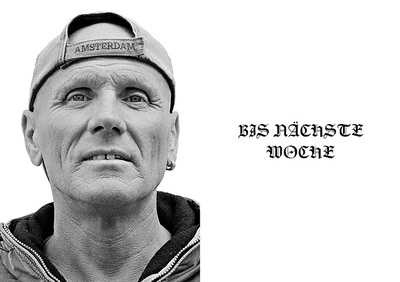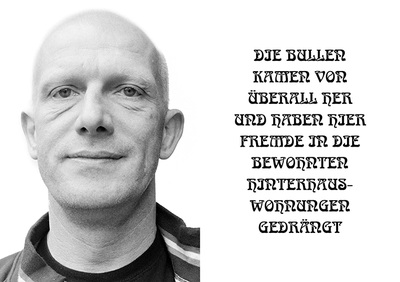DIE SCHWELLE 2013-2014
|
Pförtnerhaus Donaukurier Verlagsgesellschaft
Außenrauminstallation | Size : 4 m x 14 m x 4 m geladener Wettbewerb I 1. Preis |
Gatehouse Donaukurier publisher Ingolstadt
Outdoor installation | Size : 4 m x 14 m x 4 m invited competition: 1. Price |
|
Ein Pförtnerhaus weist eine Grenze zwischen zwei Bereichen aus, die Markierung einer Schwelle, die häufig kontrolliert wird. Im Rahmen des gewonnenen Realisierungswettbewerbs Das Pförtnerhaus wurde dieses Zwischenraum-Motiv untersucht, als Grenzbereich des öffentlichen/privaten Raumes ist es besonders vor Clubs wahrnehmbar. Die Zone vor Clubs gehört zu den wenigen existierenden Orten in der Öffentlichkeit, wo sich heterogene Gesellschaftsschichten mischen. In der Außeninstallation DIE SCHWELLE werden Fragmente dieser Szenerie, sowie die Türsteher/innen selbst, ihre individuellen Geschichten als auch die Schwellendialoge vor Ort festgehalten und präsentiert.
Ein Jahr war Alexandra Spiegel mit der Kamera in verschiedenen Städten Deutschlands wie in Berlin, Bremen, Dresden, Essen, Hamburg, Hannover, Ingolstadt, Karlsruhe, Köln und München unterwegs um diesen Schwellenbereich deutschlandweit zu untersuchen, Porträts und Wortmitschnitte von Türsteher/innen zu sammeln. Die Ergebnisse dieser Recherche – Fotos und wörtliche Zitate – wurden auf eine Husse aus PVC gedruckt, die das leerstehende Pförtnerhaus, die Grenze zwischen dem öffentlichen und privaten Bereich des Donaukurier-Verlagsgeländes in Ingolstadt, schützen soll. Die nach einem Schnittmuster konfektionierte Hülle aus bedrucktem PVC wird über das Pförtnerhaus gezogen und am Boden mit Erdankern verspannt. Die auf der Husse porträtierten Türsteher/innen werden bewusst und auch auf eigenen Wunsch anonymisiert: ihre Porträts und protokollierten Aussagen gehören nicht unmittelbar zusammen, lediglich die Schriftfonds der Zitate sind an die Clublogos angelehnt und erlauben Rückschlüsse auf den jeweiligen Club. Das Pförtnerhaus wirkt durch die einheitliche Hülle monolithisch und markiert als Landmarke den Ort der Grenzfläche. Ausstellungsort: Donaukurier Verlagsgesellschaft Stauffenbergerstraße 2A 85051 Ingolstadt Dank an: Georg Schäff, Verleger des Donaukuriers Technische und konstruktive Beratung: Prof. Dr.-Ing. Rosemarie Wagner, Fachgebiet Bautechnologie, KIT Karlsruhe Frank Bartsch, Norbert Geck, Peter Glasl, Angela Griese, Julia Härtner, Udo Hintze, Bernd Kartmann, Piet Kremer, Nikos, Uwe Lehmann, Stefan Liefländer, Stefan Reibel, Bernd Seeland, Markus Schaefer, Evelyn Seitfeld, Erich Seitz, Hon-Tan Trieu, Josef Urlauf, Heinrich Weid, Susanne Weirich, Reinhard Wittmann Mit den Türsteher/innen: Angelo, Atilla, Aykut, Bernd, Bernd, Bobo, Carsten, Christoph, Enriquo, Ersi, Farim, Frank, Hakan, Hotte, Julia, Kai, Klaus, Marcel, Marco, Micha, Mio, Mustafa, Musti, Navid, Nils, Norbert, Paul, Reiner, Rose, Sabrina, Serwat, Vali, Wolfi, Yalcin, Zurab and anonym doormen |
A gatehouse indicates a border between two areas, the defining of a threshold, which is frequently controlled. The motive of this intermediate space was examined as part of the successfully won competition The Gatehouse. The threshold between public and private space is particularly perceptible outside clubs. The area in front of clubs belongs to the few existing places in the public realm, where heterogeneous sectors of society mix. At the outdoor installation DIE SCHWELLE, fragments of this setting, including the doormen and women themselves, their individual stories and the threshold dialogue at the scene will be captured and presented.
Alexandra Spiegel spent one year travelling with her camera to different cities in Germany such as, Berlin, Bremen, Dresden, Essen, Hamburg, Hannover, Ingolstadt, Karlsruhe, Köln and München, to examine this threshold throughout Germany and to collect portraits and recordings of doormen and women. The results of this research - photos and quotes - were printed onto a PVC cover, which should shelter the empty gatehouse; the border between the public and private areas of the premises of the Donaukurier publisher in Ingolstadt. The cover, made from printed PVC and assembled using a cutting pattern, was pulled over the gatehouse and fastened to the ground with earth anchors. The doormen and women who are portrayed on the cover are aware of this fact and were anonymised at their own wishes: their portraits and recorded statements do not directly correspond to one another, only the text fonts of the quotes are based on those of the club logos and allow conclusions to be drawn about the respective clubs. The gatehouse appears monolithic due to the uniformity of the cover and marks the boundary as a landmark. Exhibition venue: Donaukurier Verlagsgesellschaft Stauffenbergerstraße 2A 85051 Ingolstadt Thanks to: Georg Schäff, publisher of the Donaukurier Technical and constructive consultation: Prof. Dr.-Ing. Rosemarie Wagner, Institute for Construction Technologies, KIT Karlsruhe Frank Bartsch, Norbert Geck, Peter Glasl, Angela Griese, Julia Härtner, Udo Hintze, Bernd Kartmann, Piet Kremer, Nikos, Uwe Lehmann, Stefan Liefländer, Stefan Reibel, Bernd Seeland, Markus Schaefer, Evelyn Seitfeld, Erich Seitz, Hon-Tan Trieu, Josef Urlauf, Heinrich Weid, Susanne Weirich, Reinhard Wittmann With the doormen and women: Angelo, Atilla, Aykut, Bernd, Bernd, Bobo, Carsten, Christoph, Enriquo, Ersi, Farim, Frank, Hakan, Hotte, Julia, Kai, Klaus, Marcel, Marco, Micha, Mio, Mustafa, Musti, Navid, Nils, Norbert, Paul, Reiner, Rose, Sabrina, Serwat, Vali, Wolfi, Yalcin, Zurab and anonym doormen |
